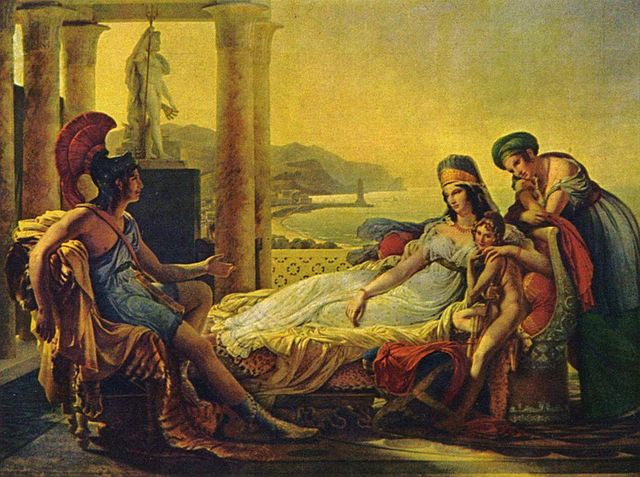The shadow of the Roman poets falls right across the entire western literary tradition: from Vergil’s Aeneid, about the fall of Troy, the wooden horse, and the founding of Rome; through the great love poets, Catullus, Propertius, and Tibullus; Ovid’s Metamorphoses, treasure-house of myth for the Renaissance and Shakespeare; to Horace’s Dulce et decorum est, echoing through the twentieth century. We all take it for granted … so now’s the time to check your working.
The post Can you get X out of X in our Latin poetry quiz? appeared first on OUPblog.
By Anatoly Liberman
I will begin with a short summary of the previous post. In English texts, the noun baron surfaced in 1200, which means that it became current not much earlier than the end of the twelfth century. It has been traced to Semitic (a fanciful derivation), Celtic, Latin (a variety of proposals), and Germanic. The Old English words beorn “man; fighter, warrior” and bearn “child; bairn” are unlikely sources of baron. Latin vir “man; husband” would not have become baron for phonetic reasons. The same holds for some other proposed Latin v-words. However, in Latin, baro1 “fool; simpleton” and baro2 “a free man” have been attested. As the putative etymons of baron both pose problems. Baro1 meant “fool” and “a strong, muscular man; a man lacking polish, someone from a province,” while baro1 emerged only in the Frankish law code (Lex Salica) known from early medieval manuscripts. The laws, even though they codified the life of a Germanic tribe, were written in Latin, so that there is no certainty that baro2 is a genuine Latin noun: it could be a Latinized Germanic legal term the scribes preferred to leave untranslated. It is hard to decide whether in dealing with Latin baro1 we have two different words (“fool” and “a strong, unpolished man”) or two meanings of the same word. If the second treatment of baro is to be preferred, then what was the way of development: from “fool” to “a strong man” or from “a strong man” to “fool”? The German linguist Franz Settegast believed that only the second alternative should be considered and derived baron from baro1, but he said nothing definite on the history of its Germanic homonym. In his opinion, baro of Lex Salica might be a different word. This is approximately where I left off last week.
As regards the fortunes of Classical Latin baro, Settegast’s idea is reasonable. He believed that, although thanks to Cicero “fool” is the best-remembered sense of baro, it is not the original one. More probably, he suggested, the word arose with the meaning “a strong man” and later acquired the negative connotations “hillbilly, rough person,” as opposed to someone who learned good manners in the capital, was urbane, and depended on his intellect rather than physical strength. Some analogs Settegast cited missed the point, but for his main argument one can find ample confirmation. Thus, in animal folklore, brawn never goes together with brain. The trickster of animal tales is usually a smart weakling: the cat, the coyote, Brer Rabbit, and the rest. Even the fox, though certainly not a puny creature, is smaller and weaker than the wolf and the bear. The trickster’s dupes are the wolf and the bear.

The Gipsy baron of Johann Strauss
As usual in such cases, Settegast had to depend on one or more missing links. He assumed that baro developed in two ways: in one direction it allegedly went from “a strong man” to “fool” and in the other to “*fighter, *warrior, *man” and further to “baron.” The senses I marked with asterisks have not been recorded. Yet many influential specialists in the history of Latin and the Romance languages accepted Settegast’s reconstruction. Despite the consensus the pendulum soon swung in the opposite direction, and etymologists returned to the idea that baron could not be related to a word meaning “fool; simpleton” and traced it to Old High German baro, as we know it from Lex Salica. To support this derivation, one had to offer a plausible etymology of German baro, and Settegast’s opponents came up with the following. There is an Old Icelandic verb berja “to strike,” a cognate of Latin ferio “to strike; kill”; its reflexive form berja-sk means “to fight” (that is, “to exchange blows”). Old High German baro emerged in this scheme as “fighter,” an ideal semantic etymon of baron. However, Icelandic did not have the noun bero “fighter.” Only Old High German bero is known, but it is related to the verb beran “bear; carry” and means “carrier, porter.” It has nothing to do with Icelandic berja ~ berjask. Baro “fighter” ended up with the single support of the nonexistent noun bero “fighter” and nouns like Icelandic bardagi “battle.”
The derivation of baron from Germanic found the support of practically all later etymologists except, predictably, Settegast, who mounted a spirited defense of his old idea, but this time his voice was not heard. His reconstruction did not illuminate every dark corner (remember the asterisked forms, cited above!), but the Germanic reconstruction fares even worse. Settegast refuted the main objection to his theory (“baron” cannot go back to “fool”; of course, it cannot), so that there is no need to repeat the same seemingly crushing counterargument again and again. If Latin baro yielded not only “fool” but also “fighter,” from “a strong man,” then baro, as it occurs in Lex Salica, is a Latin noun.
In my rejection of the Germanic etymology of baron from berjask I am not quite alone. Pierre Guirot, a French etymologist who supports many untraditional solutions, returned to the idea that baron originated in Latin. Regrettably, he offered his opinion without offering detailed proof. Harri Meyer, a distinguished linguist but another maverick of Romance philology, tended to agree with Guirot. Clearly, the tide has not turned. But it does not follow that we have only two choices: either to derive baron from Latin baro or to trace it to Germanic berjask. There is at least one more possibility.
Etymology is a tale of eternal return. Old conjectures tend to resurface in a new light and make us look at forgotten or discarded ideas with interest and even respect. In the early sixties of the nineteenth century, the question was asked whether baron could be a continuation of some word like German Wehrmann “soldier.” Obviously, -on in baron and -mann in Wehrmann are not related. But what about Wehr “defense”? About seventy years later George G. Nicholson had an idea that returned him to Wehr, though, of course, he had no knowledge of an old exchange in Notes and Queries. He paid special attention to the common use of Old French baron with the genitive (“the baron of…”), for example, in li bon baron de France “the good defender, protector of France.” The English equivalent of the Latin phrase barones quinque portuum (which alternated with custodes quinque portuum) is Wardens of the Cinque Ports. In Old French, the word baron was applied to the king, saints, and even Jesus Christ, so that the sense “protector, defender” cannot be called into question.
Nicholson analyzed Old High German words whose English cognates are aware, beware, warn, ward, and warden (their root is war-), and derived baron from the reconstructed Romance form waronem-. The Romance languages did borrow the Germanic root war-, as testified, among others, by guardian, a doublet of warden. Waronem- “protector” would explain the well-attested sense of baron “man.” As mentioned in the previous post, the alternation w/v- ~ b- poses no insurmountable difficulties. Even the native Latin speakers noticed it, and a doublet of Spanish baron is varón “man, male.” The Portuguese form is similar.
Nicholson’s etymology invites serious consideration. Settegast was probably right in not considering “fool” the original sense of Latin baro, but he had a hard time of tracing the path from “a muscular man” to “fighter,” “man; husband,” and, finally, to “baron.” We may also concur with him that Italian barone “rogue” and barone “baron” continue the same Latin etymon. The association between baron and the cognates of Icelandic berjask does not look promising, and one should treat without much confidence the often-repeated statement that Latin had the word baro before the arrival of the Franks. It probably did not. More likely, baron is a Romance adaptation of Germanic waronem-. And couldn’t this coinage (baron) spread to the Celtic-speaking world? Old Irish bár “wise man, sage; leader; overseer,” especially “overseer,” resembles “protector,” the more so because one of the glosses of barons was Latin custodes (the plural of custos). In Ireland, the word might enjoy a shady existence as a legal foreignism, and, presumably, that is why it never occurred in native literature. If such was the state of affairs, barons emerged as protectors and “custodians.” The way from “protector” to “man; husband; fighter” is short. Thus, baron may be, after all, a Germanic word, but going back to an etymon quite different from the one mentioned in our dictionaries.
 Anatoly Liberman is the author of Word Origins And How We Know Them as well as An Analytic Dictionary of English Etymology: An Introduction. His column on word origins, The Oxford Etymologist, appears on the OUPblog each Wednesday. Send your etymology question to him care of [email protected]; he’ll do his best to avoid responding with “origin unknown.” Subscribe to Anatoly Liberman’s weekly etymology articles via email or RSS.
Anatoly Liberman is the author of Word Origins And How We Know Them as well as An Analytic Dictionary of English Etymology: An Introduction. His column on word origins, The Oxford Etymologist, appears on the OUPblog each Wednesday. Send your etymology question to him care of [email protected]; he’ll do his best to avoid responding with “origin unknown.” Subscribe to Anatoly Liberman’s weekly etymology articles via email or RSS.
Subscribe to the OUPblog via email or RSS.
Subscribe to only language articles on the OUPblog via email or RSS.
Image credit: Alexander Girardi, austrian actor; seen in Johann Strauss II: The Gypsy Baron. Portrait Collection Friedrich Nicolas Manskopf at the library of the Johann Wolfgang Goethe-University Frankfurt am Main. ID: S36_F08653. Public domain via Wikimedia Commons.
The post A globalized history of “baron,” part 2 appeared first on OUPblog.

By J. C. McKeown
The National September 11 Memorial Museum will be opened in a few weeks. On the otherwise starkly bare wall at the entrance is a 60-foot-long inscription in 15-inch letters made from steel salvaged from the twin towers: NO DAY SHALL ERASE YOU FROM THE MEMORY OF TIME. This noble sentiment is a quotation from Virgil’s Aeneid, one of mankind’s highest literary achievements, but its appropriateness has been questioned. In the context of the Aeneid, Virgil is commemorating a homosexual pair of warriors killed while making a bloody surprise attack on their sleeping enemies’ camp. Three years ago, an article in the New York Times suggested that “anyone troubling to take even a cursory glance at the quotation’s context will find the choice offers neither instruction nor solace.” But the museum was unmoved by such objections, and its director has recently defended the choice, asserting, perhaps rather cryptically, that the quotation characterizes the “museum’s overall commemorative context.”
It is unfortunate that this controversy has arisen, especially since so few people nowadays know about the context of the quote in the Aeneid. Those who lost family members or friends in the attacks should not have their thoughts and feelings distracted in this way. The sentiments expressed on national monuments aim to be strongly and unambiguously assertive of a view held by the whole community, but perhaps they are inherently vulnerable to controversial interpretations. Ideally, of course, such quotations should resonate more deeply than the meaning of the actual words, but would it not be best to accept the obviously sincere intentions of the museum’s committee and let the matter drop?

“It is sweet and fitting to die for one’s country” in classical Greek on a memorial honoring the dead in the First Balkan War. Credit: J.C. McKeown
Otherwise, where will it end? Should we hesitate about using dulce et decorum est pro patria mori (“It is sweet and fitting to die for one’s country”), a line by Horace, Virgil’s contemporary, found so often on war memorials? In the 1910s, it was inscribed at Arlington and at Sandhurst, the British military academy, and was even translated into classical Greek (mirabile dictu!) on a memorial honoring the dead in the First Balkan War.
Before the decade was out, however, in the most celebrated of all World War I poems, Wilfred Owen had described Horace’s line as “the old lie.” Horace’s own authority to voice such ideals may be questioned. He was writing a poem of national significance–it is one of his “Roman Odes”–but the very next line, “death pursues even the man who runs away,” might make us recall a different poem in which Horace rather flippantly admits that he had thrown away his shield and fled at the Battle of Philippi. These considerations may give us pause for thought, but the validity of dulce et decorum in a national context is not diminished.
Carpe diem is perhaps the most ubiquitous of all Latin tags, but few people are aware of its original use: Horace is trying to persuade a girl to sleep with him. In another quote from the same book of Odes, Horace assures us that a person who is integer vitae scelerisque purus (“He who lives an unblemished life and is not tainted with crime”) is under divine protection, but the poem is essentially trivial, for Horace’s guardian deity turns out to be Cupid, who keeps wolves at bay while he sings in the woods about his mistress; even so, the poem was sung for centuries at Swedish funerals.
The fundamental democratic principles of equality and unity encapsulated so precisely in e pluribus unum are surely not diminished by the possibility that it was inspired by a phrase from an inconsequential poem attributed to Virgil: color est e pluribus unus (“from being several, the color is one”), in a description of an old peasant grinding the various ingredients together to make a vegetable pâté for his breakfast.
We have difficulties enough with the nuances of our own language. How many of those who wear T-shirts emblazoned with The Road Not Taken regard Frost’s best known poem not so much as a declaration of their free spirit, but rather as “that cunning nugget of nihilism disguised as an anthem for nonconformity” (New Yorker, 10 February 2014)?
Even Virgil himself has been charged with quoting inappropriately. When Aeneas stammers to Dido’s ghost in the Underworld, invitus, regina, tuo de litore cessi (“unwillingly, O queen, I left your shore”), it is an undoubted echo of Catullus’s translation of an elegant Hellenistic court poem, in which a lock of Queen Berenice’s hair laments that it is now a constellation, no longer with the queen: invita, o regina, tuo de vertice cessi (“unwillingly, O queen, I left your head”). To quote the standard commentary on Virgil’s line: “modern susceptibilities are pained by Virgil’s presumed indifference to the incongruity so produced.”

Aeneas tells Dido the misfortunes of the Trojan city. Oil on canvas, 1815. Pierre-Narcisse Guérin, The Louvre. Public Domain via Wikimedia Commons.
There is classical precedent for changing a memorial inscription. After the Greek victory over the Persians at Plataea in 479 BC, the Greek commander set up an inscription at Delphi: “Pausanias, leader of the Greeks, when he destroyed the army of the Persians, dedicated this memorial to Apollo.” He was ordered to remove it, and told he could put it up again when he had defeated the Persians single-handedly. Might that be the best solution to all this controversy? The task of re-writing the inscription might be given to Billy Collins, who was Poet Laureate at the time of the attacks. He would be sure to resist those who want to:
“tie the poem to a chair with rope
and torture a confession out of it.
They begin beating it with a hose
to find out what it really means.”
J. C. McKeown is Professor of Classics at the University of Wisconsin-Madison, co-editor of the Oxford Anthology of Roman Literature, and author of A Cabinet of Greek Curiosities, A Cabinet of Roman Curiosities, and Classical Latin: An Introductory Course.
Subscribe to the OUPblog via email or RSS.
Subscribe to only classics and archaeology articles on the OUPblog via email or RSS.
The post The 9/11 memorial and the Aeneid: misappropriation or sincere sentiment? appeared first on OUPblog.





 Anatoly Liberman is the author of
Anatoly Liberman is the author of 
